Abstract
Psychotherapy research should ultimately benefit the psychotherapy client. Unfortunately, traditional psychotherapy research continues to have little influence on practicing clinicians and, therefore, does not benefit psychotherapy clients. As behavior analysts begin to show interest in this area of research, they may be in a position to improve its quality. We argue that traditional psychotherapy researchers have become prematurely wedded to a methodology that does not address the concerns of clinical audiences. Furthermore, we make a case for defining and evaluating psychotherapy data in terms of its capacity to influence both researchers and clinicians. We also suggest several alternative methods for gathering psychotherapy data based on the case formulation approach. We argue that this approach may be one of the most promising methods for gathering useful psychotherapy data.
Keywords: psychotherapy research, persuasion criteria, psychotherapy practice, case formulation, audience variables, clinical behavior analysis
Full text
PDF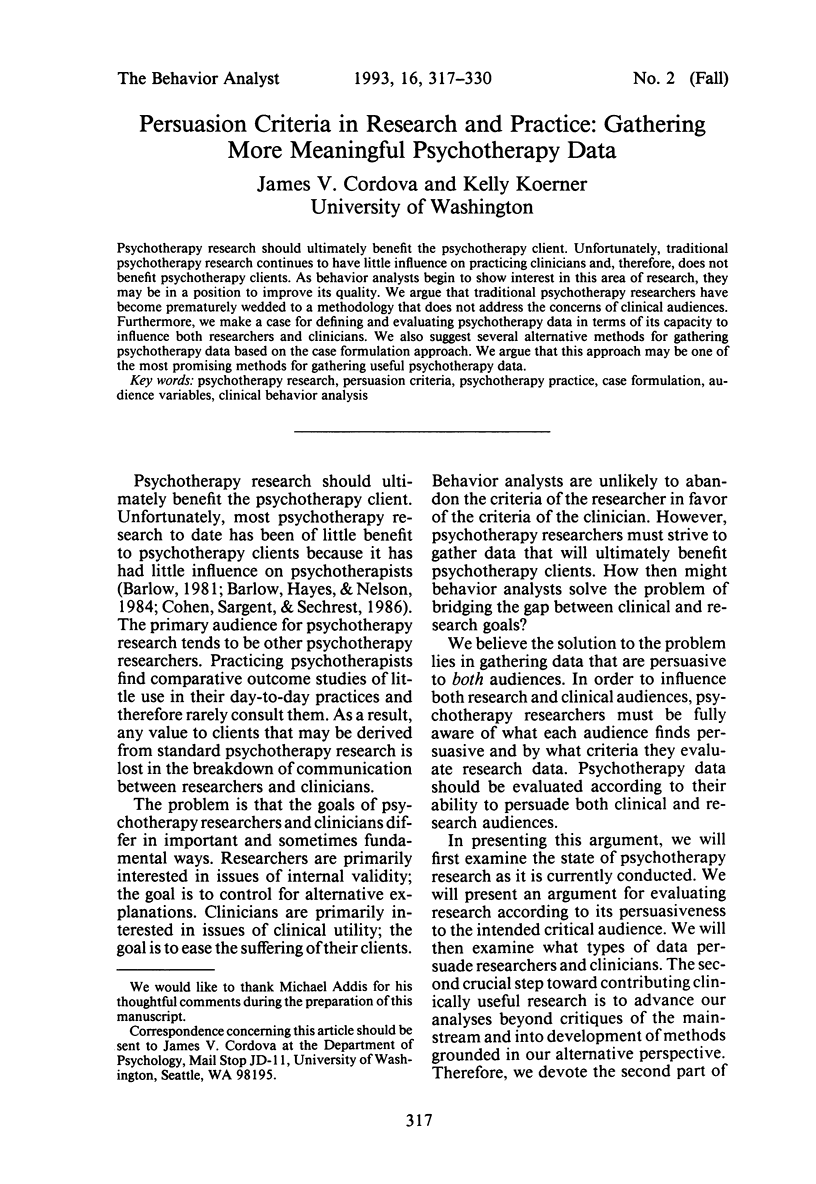
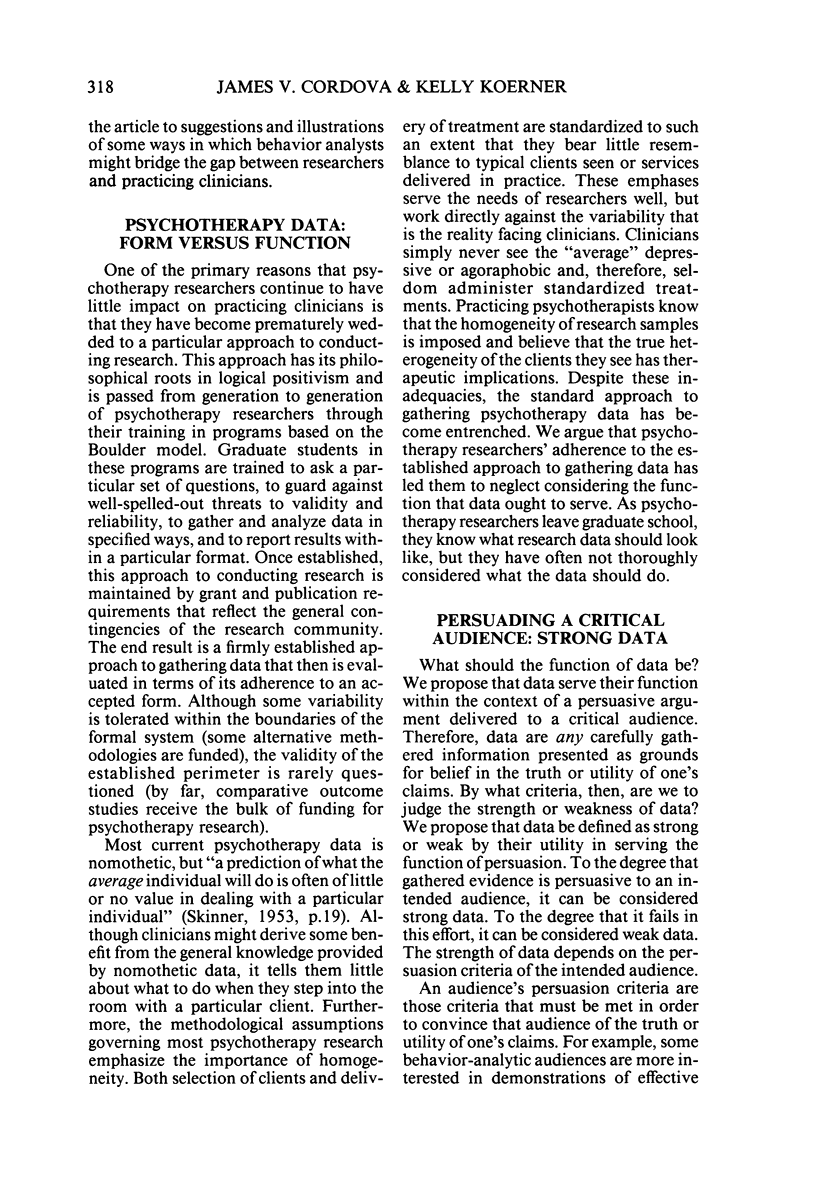
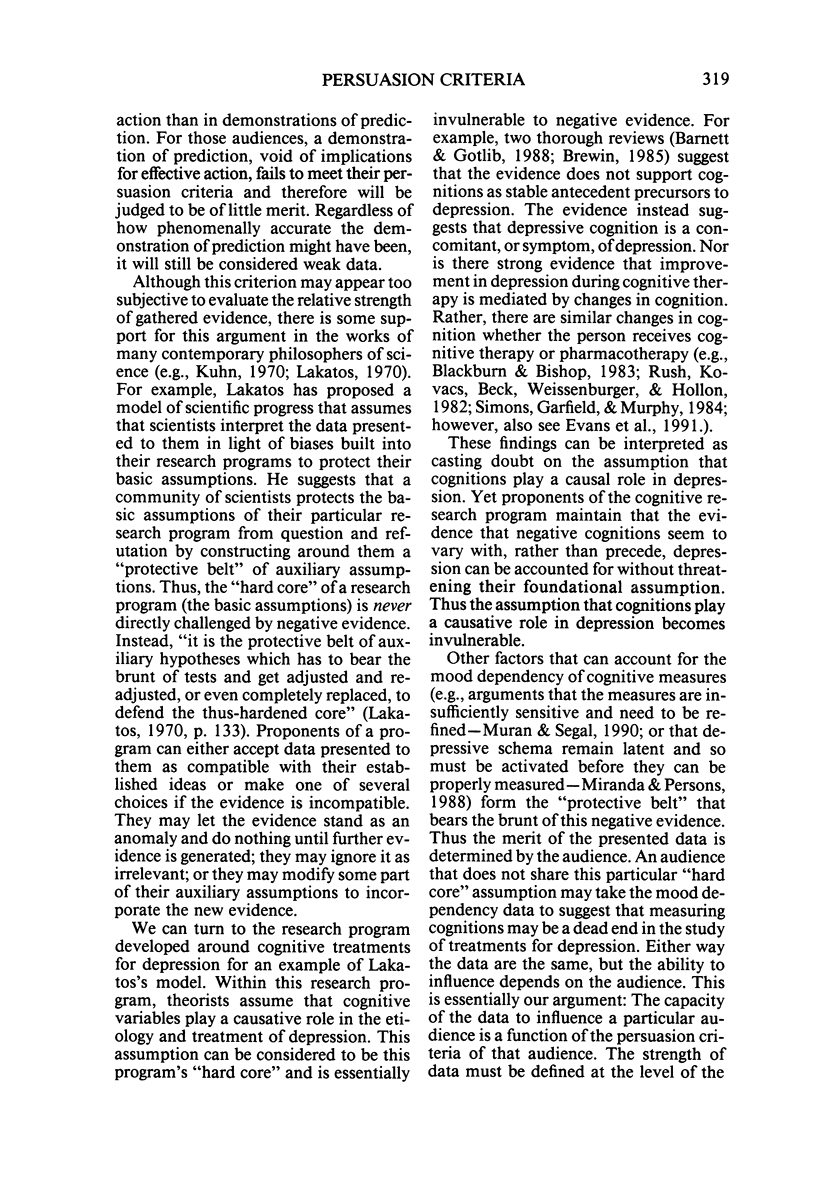
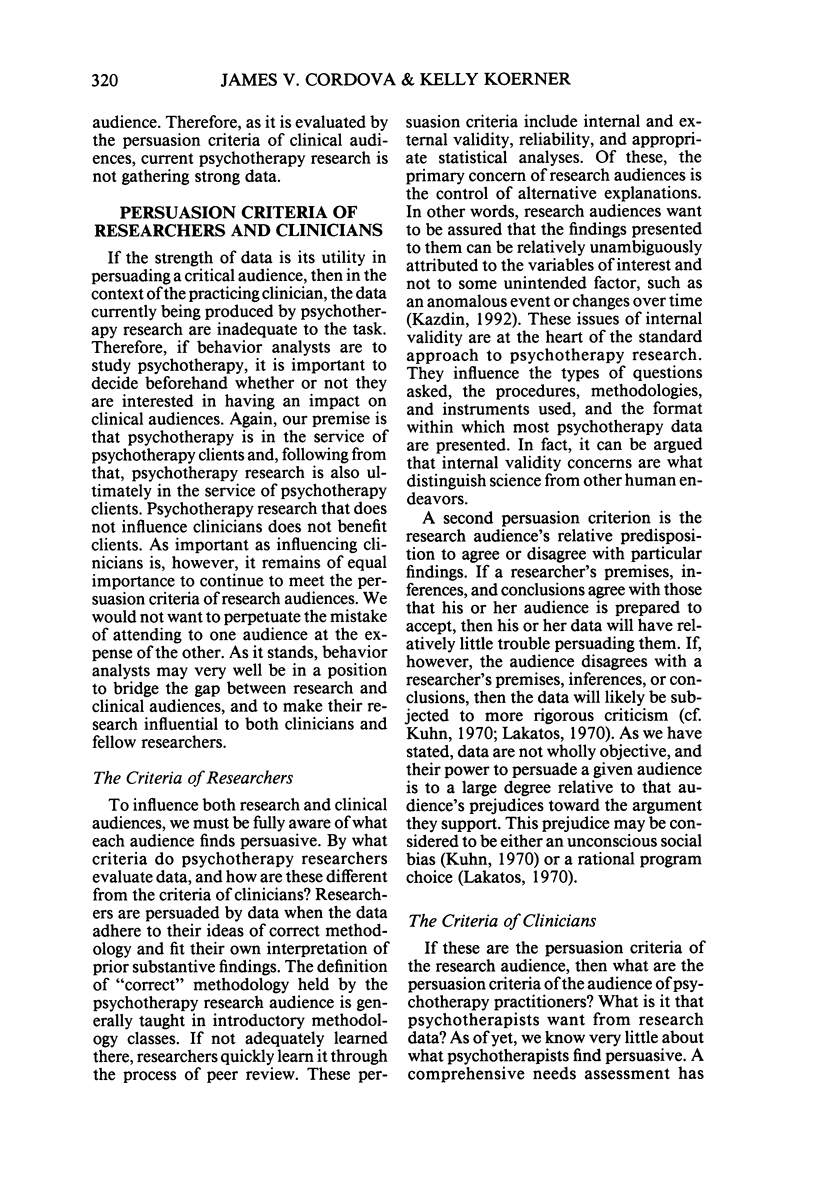
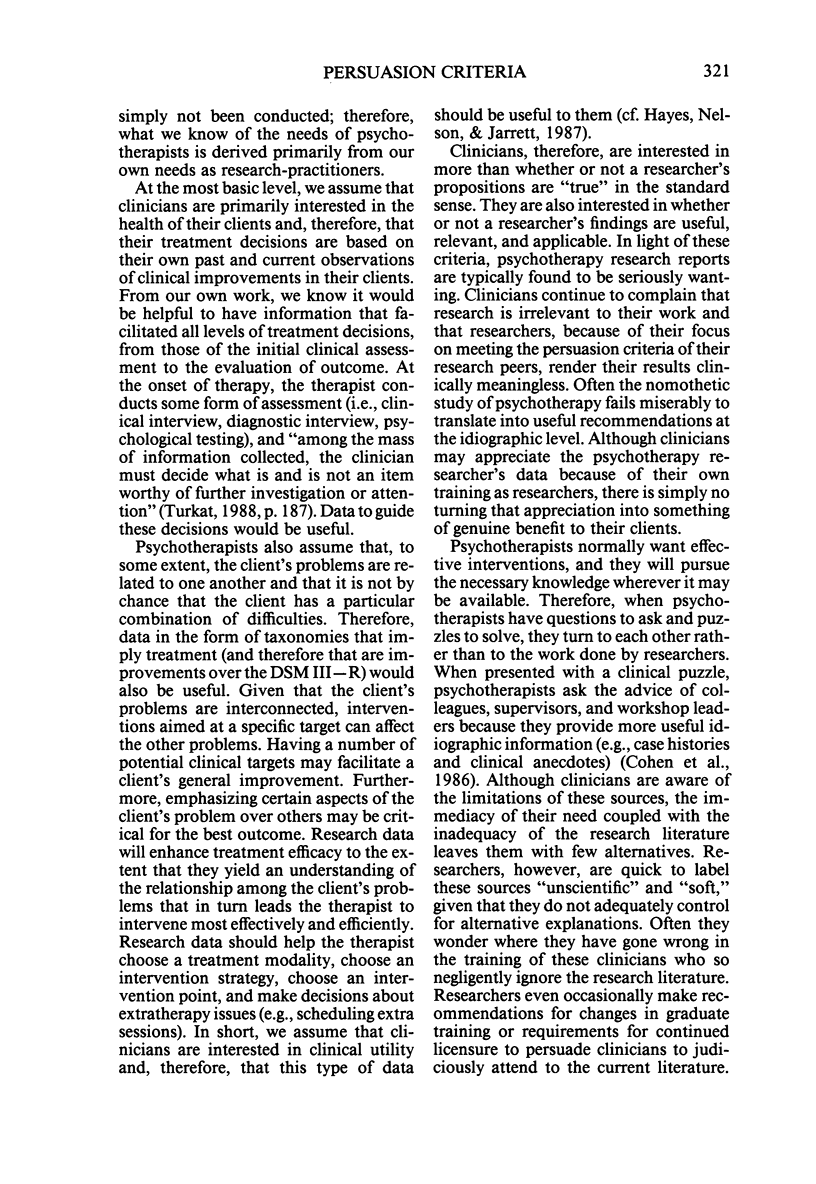
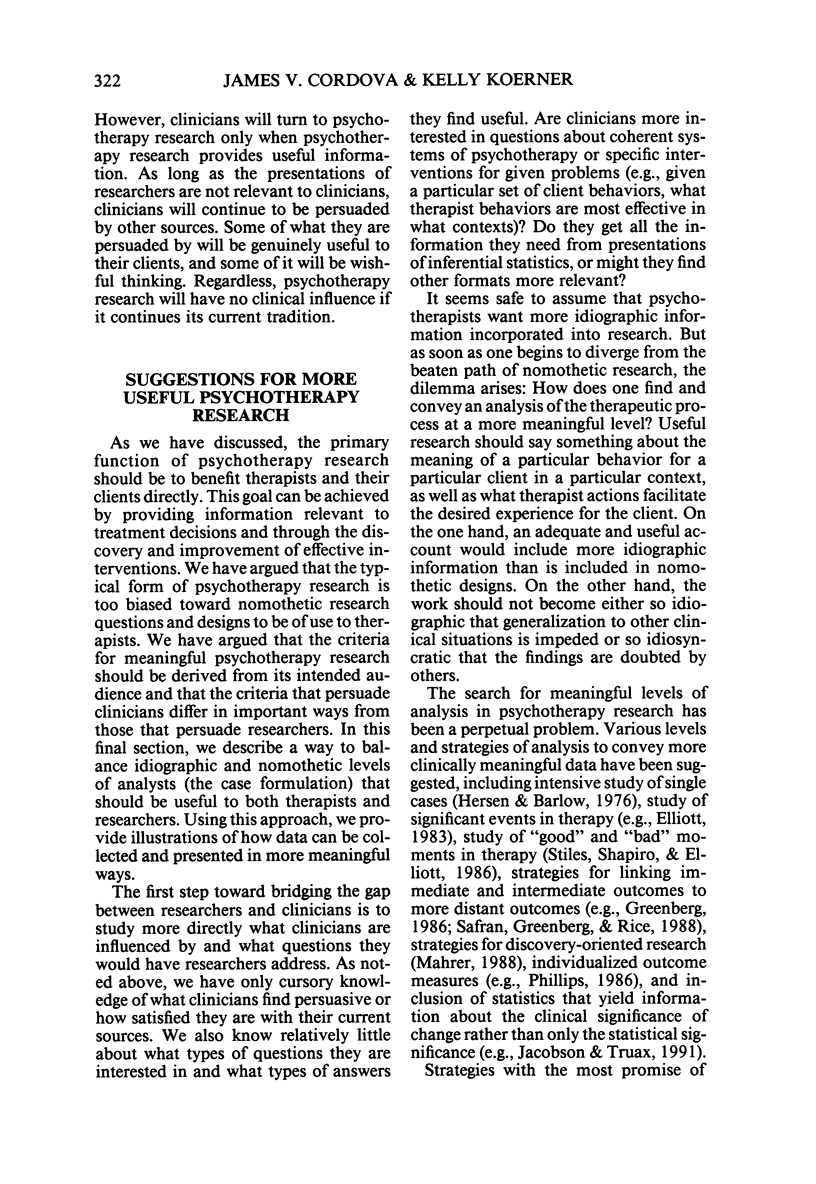
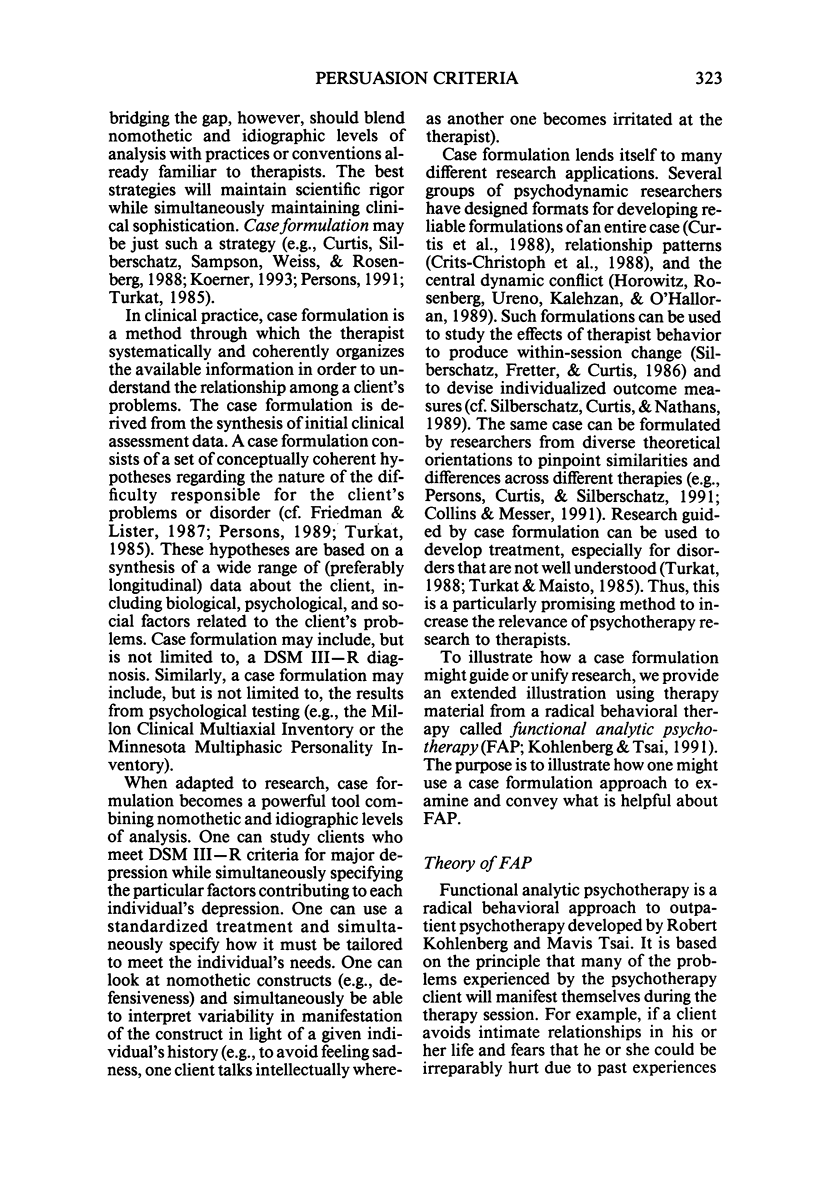
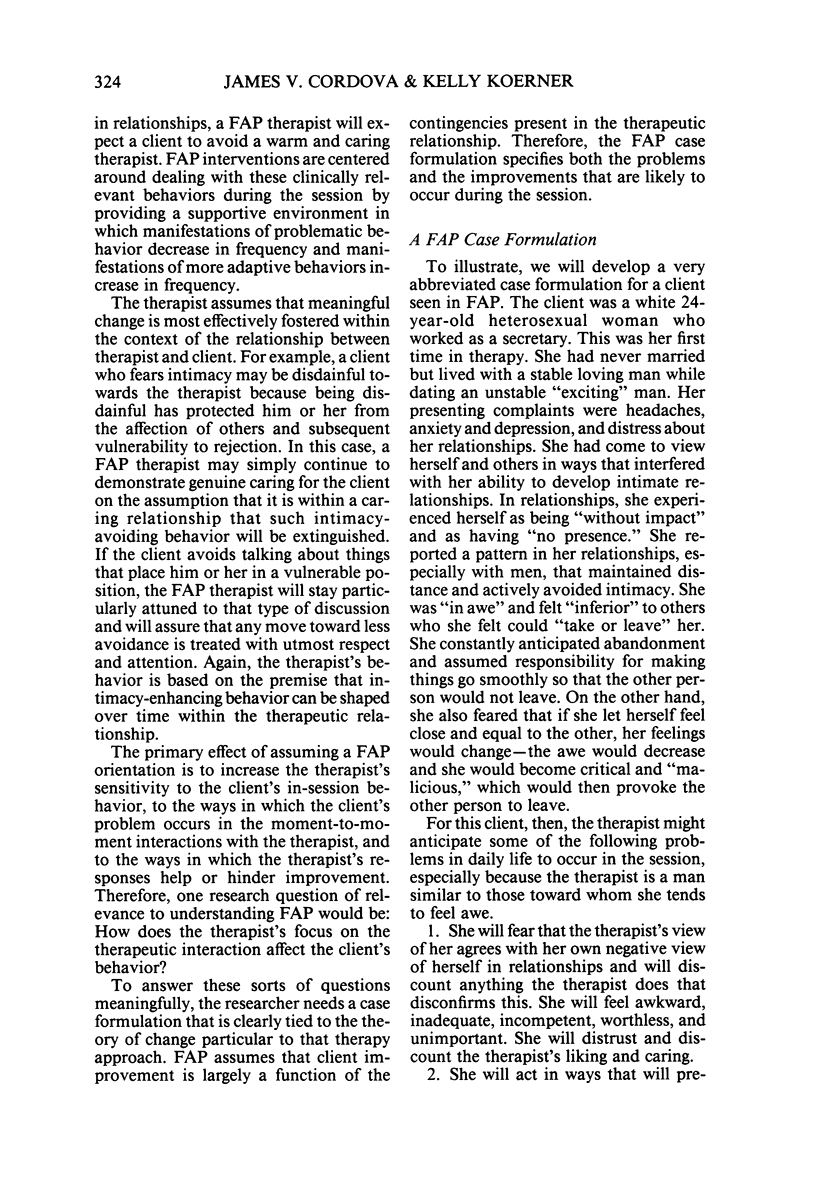
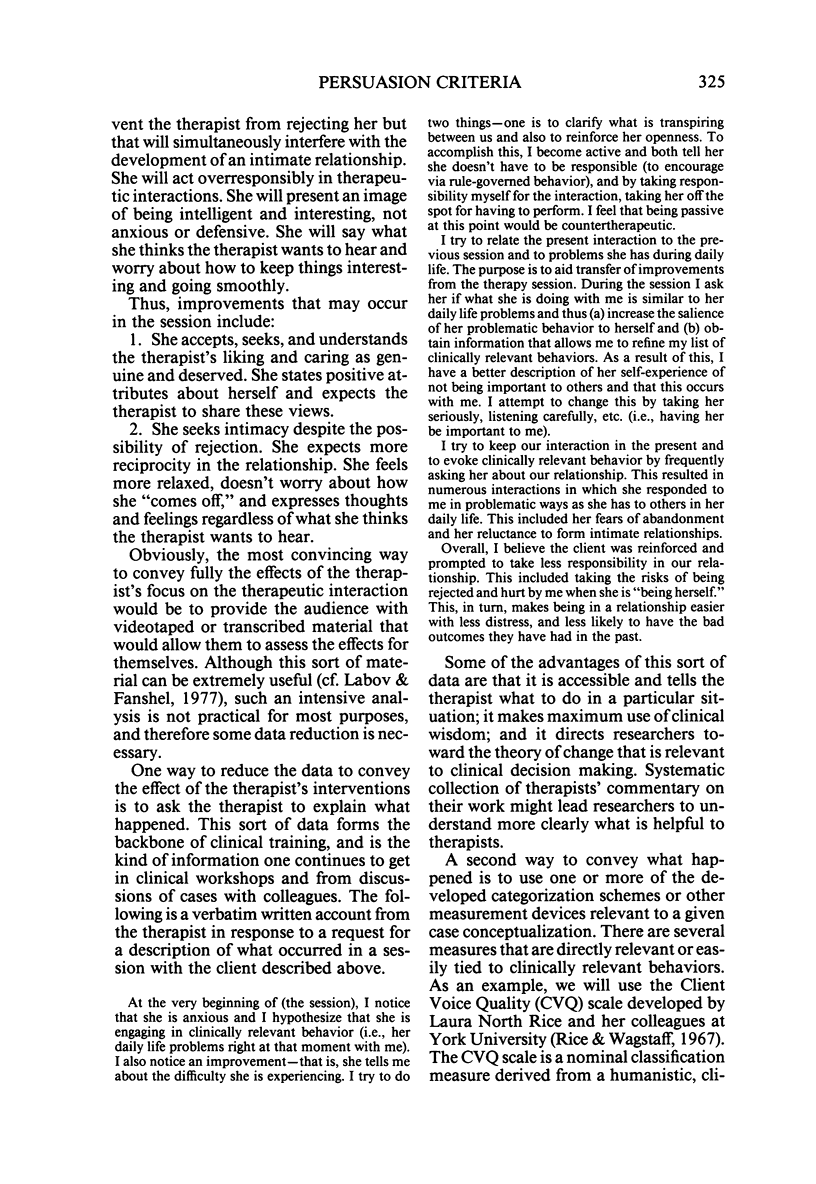
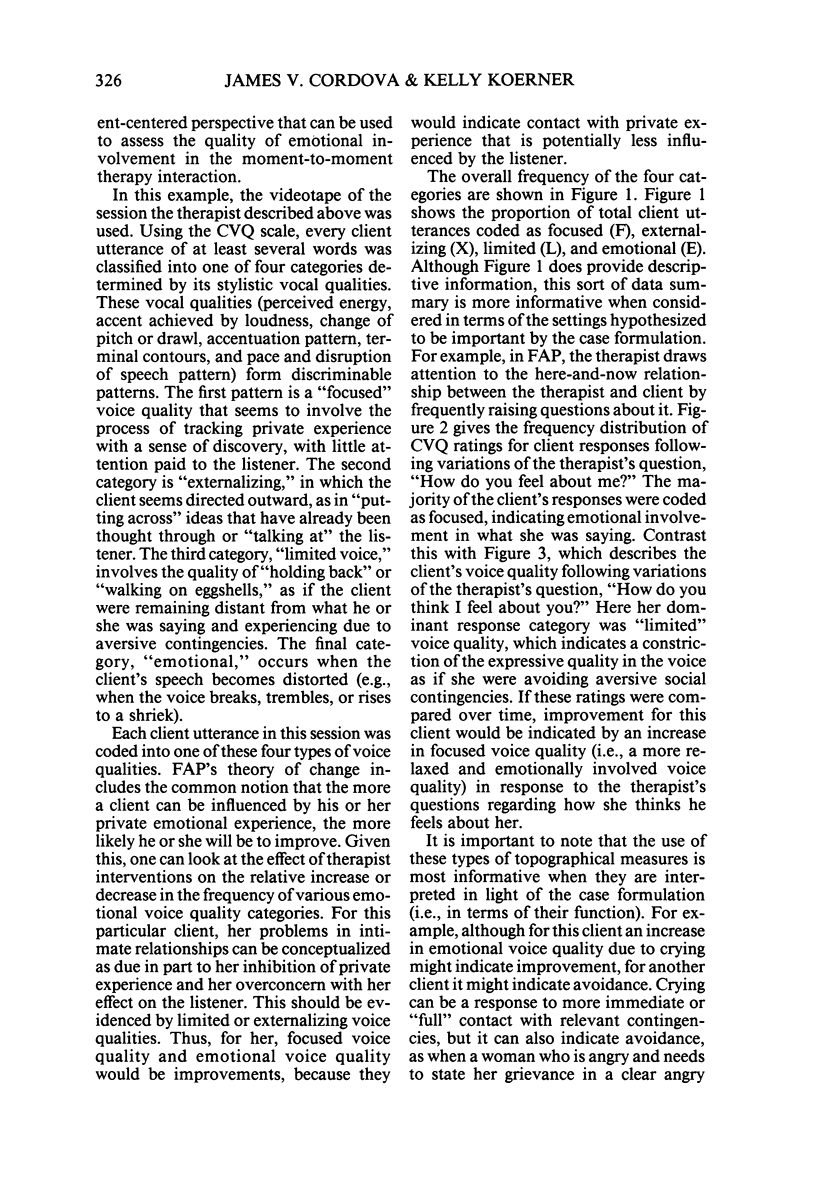
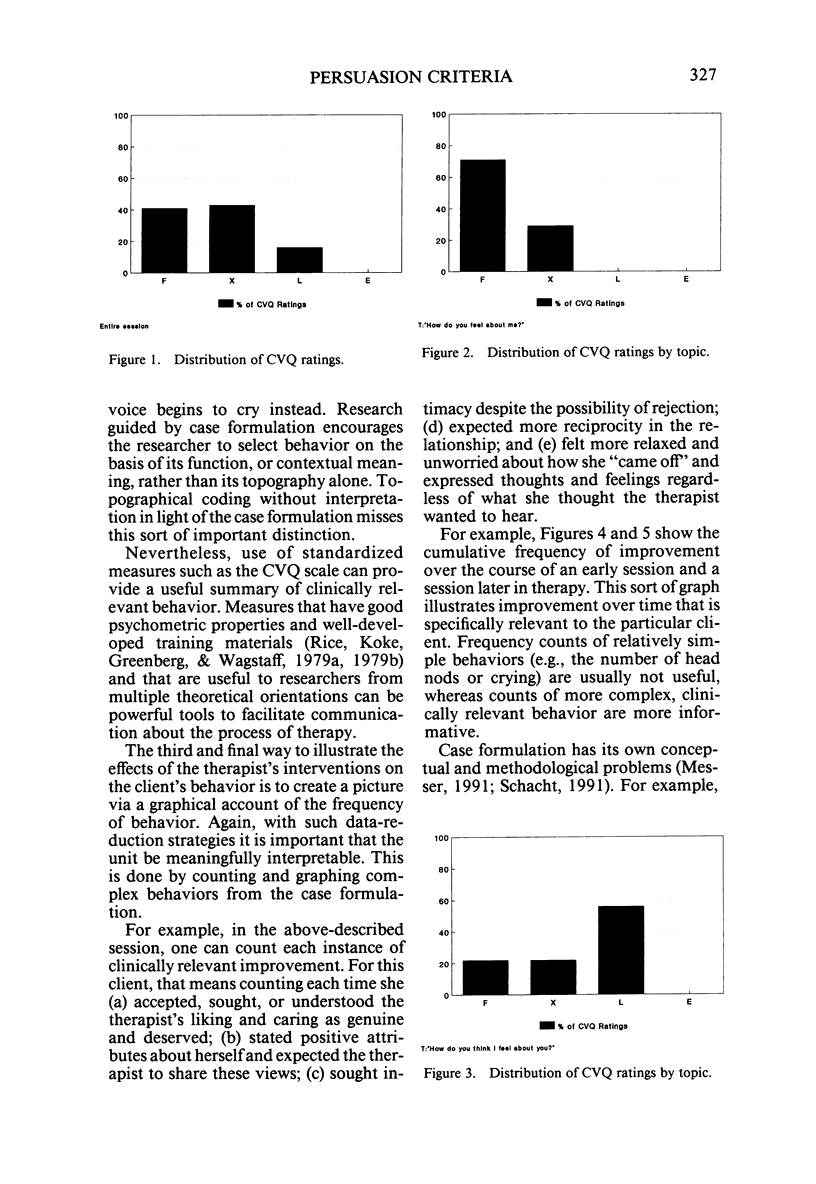
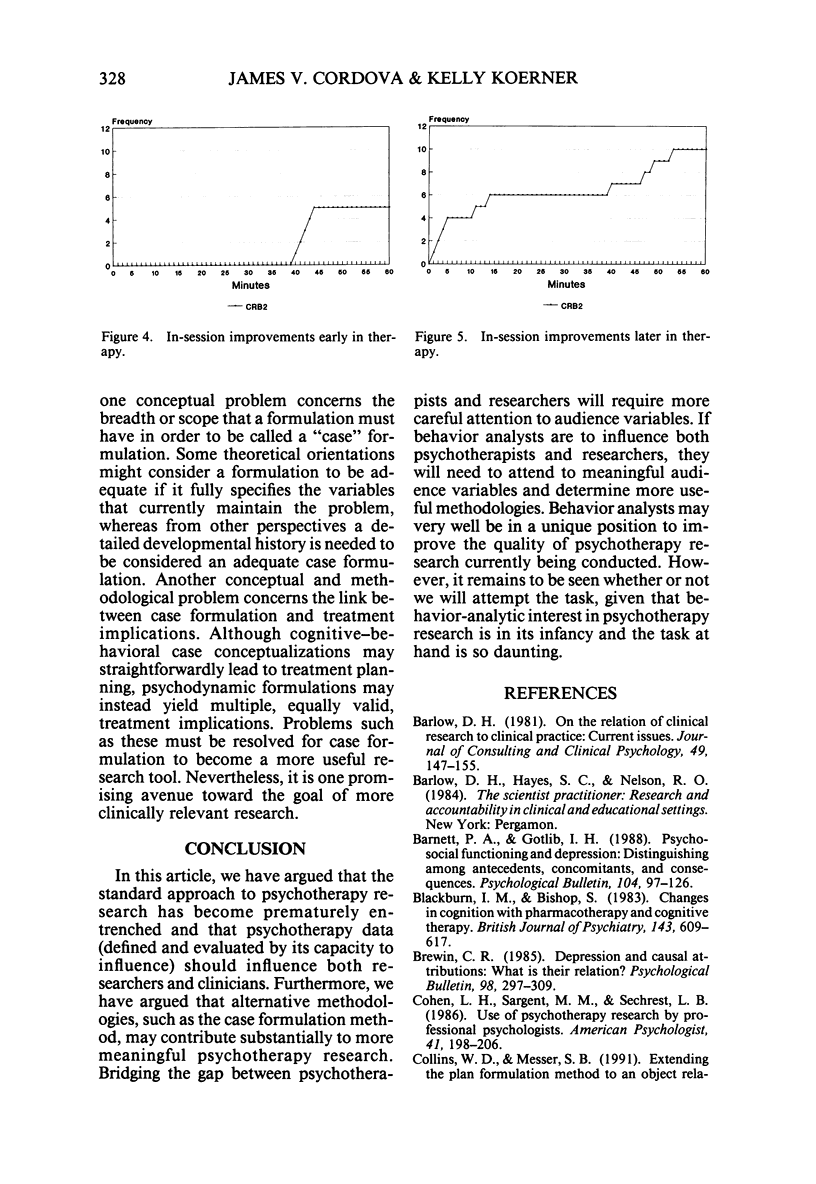
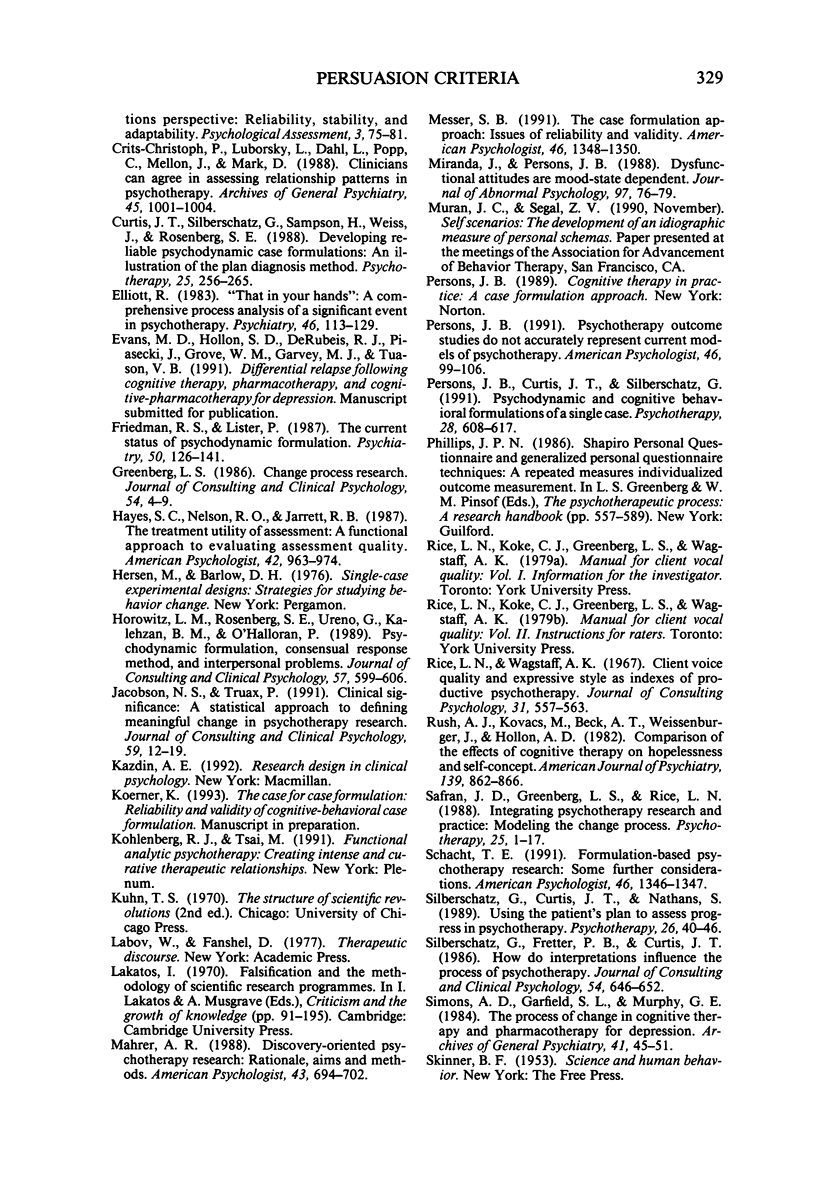

Selected References
These references are in PubMed. This may not be the complete list of references from this article.
- Barlow D. H. On the relation of clinical research to clinical practice: current issues, new directions. J Consult Clin Psychol. 1981 Apr;49(2):147–155. doi: 10.1037//0022-006x.49.2.147. [DOI] [PubMed] [Google Scholar]
- Barnett P. A., Gotlib I. H. Psychosocial functioning and depression: distinguishing among antecedents, concomitants, and consequences. Psychol Bull. 1988 Jul;104(1):97–126. doi: 10.1037/0033-2909.104.1.97. [DOI] [PubMed] [Google Scholar]
- Blackburn I. M., Bishop S. Changes in cognition with pharmacotherapy and cognitive therapy. Br J Psychiatry. 1983 Dec;143:609–617. doi: 10.1192/bjp.143.6.609. [DOI] [PubMed] [Google Scholar]
- Brewin C. R. Depression and causal attributions: what is their relation? Psychol Bull. 1985 Sep;98(2):297–309. [PubMed] [Google Scholar]
- Cohen L. H., Sargent M. M., Sechrest L. B. Use of psychotherapy research by professional psychologists. Am Psychol. 1986 Feb;41(2):198–206. doi: 10.1037//0003-066x.41.2.198. [DOI] [PubMed] [Google Scholar]
- Crits-Christoph P., Luborsky L., Dahl L., Popp C., Mellon J., Mark D. Clinicians can agree in assessing relationship patterns in psychotherapy. The Core Conflictual Relationship Theme method. Arch Gen Psychiatry. 1988 Nov;45(11):1001–1004. doi: 10.1001/archpsyc.1988.01800350035005. [DOI] [PubMed] [Google Scholar]
- Elliott R. "That in your hands". A comprehensive process analysis of a significant event in psychotherapy. Psychiatry. 1983 May;46(2):113–129. [PubMed] [Google Scholar]
- Friedman R. S., Lister P. The current status of psychodynamic formulation. Psychiatry. 1987 May;50(2):126–141. [PubMed] [Google Scholar]
- Greenberg L. S. Change process research. J Consult Clin Psychol. 1986 Feb;54(1):4–9. doi: 10.1037//0022-006x.54.1.4. [DOI] [PubMed] [Google Scholar]
- Hayes S. C., Nelson R. O., Jarrett R. B. The treatment utility of assessment. A functional approach to evaluating assessment quality. Am Psychol. 1987 Nov;42(11):963–974. doi: 10.1037//0003-066x.42.11.963. [DOI] [PubMed] [Google Scholar]
- Horowitz L. M., Rosenberg S. E., Ureño G., Kalehzan B. M., O'Halloran P. Psychodynamic formulation, consensual response method, and interpersonal problems. J Consult Clin Psychol. 1989 Oct;57(5):599–606. doi: 10.1037//0022-006x.57.5.599. [DOI] [PubMed] [Google Scholar]
- Jacobson N. S., Truax P. Clinical significance: a statistical approach to defining meaningful change in psychotherapy research. J Consult Clin Psychol. 1991 Feb;59(1):12–19. doi: 10.1037//0022-006x.59.1.12. [DOI] [PubMed] [Google Scholar]
- Mahrer A. R. Discovery-oriented psychotherapy research. Rationale, aims, and methods. Am Psychol. 1988 Sep;43(9):694–702. doi: 10.1037//0003-066x.43.9.694. [DOI] [PubMed] [Google Scholar]
- Messer S. B. The case formulation approach: issues of reliability and validity. Am Psychol. 1991 Dec;46(12):1348–1350. doi: 10.1037//0003-066x.46.12.1348. [DOI] [PubMed] [Google Scholar]
- Miranda J., Persons J. B. Dysfunctional attitudes are mood-state dependent. J Abnorm Psychol. 1988 Feb;97(1):76–79. doi: 10.1037//0021-843x.97.1.76. [DOI] [PubMed] [Google Scholar]
- Persons J. B. Psychotherapy outcome studies do not accurately represent current models of psychotherapy. A proposed remedy. Am Psychol. 1991 Feb;46(2):99–106. doi: 10.1037//0003-066x.46.2.99. [DOI] [PubMed] [Google Scholar]
- Rice L. N., Wagstaff A. K. Client voice quality and expressive style as indexes of productive psychotherapy. J Consult Psychol. 1967 Dec;31(6):557–563. doi: 10.1037/h0025164. [DOI] [PubMed] [Google Scholar]
- Rush A. J., Beck A. T., Kovacs M., Weissenburger J., Hollon S. D. Comparison of the effects of cognitive therapy and pharmacotherapy on hopelessness and self-concept. Am J Psychiatry. 1982 Jul;139(7):862–866. doi: 10.1176/ajp.139.7.862. [DOI] [PubMed] [Google Scholar]
- Schacht T. E. Formulation-based psychotherapy research: some further considerations. Am Psychol. 1991 Dec;46(12):1346–1347. doi: 10.1037//0003-066x.46.12.1346. [DOI] [PubMed] [Google Scholar]
- Schikler K. N., Lane E. E., Seitz K., Collins W. M. Solvent abuse associated pulmonary abnormalities. Adv Alcohol Subst Abuse. 1984 Spring;3(3):75–81. doi: 10.1300/J251v03n03_07. [DOI] [PubMed] [Google Scholar]
- Silberschatz G., Fretter P. B., Curtis J. T. How do interpretations influence the process of psychotherapy? J Consult Clin Psychol. 1986 Oct;54(5):646–652. doi: 10.1037//0022-006x.54.5.646. [DOI] [PubMed] [Google Scholar]
- Simons A. D., Garfield S. L., Murphy G. E. The process of change in cognitive therapy and pharmacotherapy for depression. Changes in mood and cognition. Arch Gen Psychiatry. 1984 Jan;41(1):45–51. doi: 10.1001/archpsyc.1984.01790120049007. [DOI] [PubMed] [Google Scholar]
- Stiles W. B., Shapiro D. A., Elliott R. "Are all psychotherapies equivalent?". Am Psychol. 1986 Feb;41(2):165–180. doi: 10.1037//0003-066x.41.2.165. [DOI] [PubMed] [Google Scholar]


